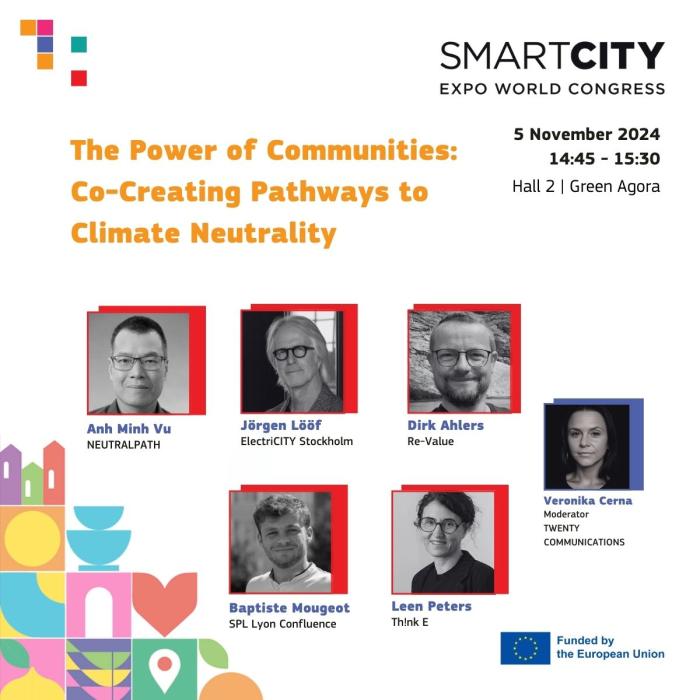
The Power of Communities: Co-Creating Pathways to Climate Neutrality agora session took place on 5 November at the Smart Cities Expo World Congress in 2024 and addressed one of the most critical aspects of building climate-neutral and Positive Energy Districts, effective stakeholder engagement. While technology plays an important role, the real challenge lies in aligning the diverse interests and priorities of various stakeholders—ranging from citizens and local governments to businesses and energy providers. When these groups fail to collaborate effectively, valuable opportunities can be lost, and progress can stall. This session moderated by Veronika Cerna from Scalable Cities Secretariat and Twenty Communications focused on how to bridge these gaps by bringing together different perspectives and fostering collaborative decision-making processes that can drive sustainable urban development.
Anh Minh Vu, Project Coordinator for the City of Dresden, shared insights from the NEUTRALPATH Project on stakeholder engagement including the use of gamification and interactive workshops. Dresden’s success in driving climate-neutral initiatives is rooted in its emphasis on democratic engagement from the outset. As Anh Minh Vu stated “Democracy is what stood out. Engaging the community from the start has been key to driving success in climate-neutral initiatives.” An example of this is the Dresden Zero initiative that brought support for a public referendum in order to push the city council to address climate change. This approach has been fundamental in fostering collaboration and building a sense of ownership amongst local communities, which has played a critical role in the city's sustainable transformation.
Jörgen Lööf, CEO of ElectriCITY in Stockholm, discussed the importance of eco-governance and energy communities. Jörgen highlighted how educating citizens and holding regular "energy meetings" had fostered collaboration between citizens and local authorities. He also presented ElectriCITY’s microgrid project designed with an open protocol that allows different energy solutions to be connected seamlessly through a new energy management application.
Baptiste Mougeot, Project Manager at Lyon Confluence, provided an overview of Scalable Cities and showcased how Lyon Confluence actively engaged with stakeholders to foster collaboration in urban transformation. By highlighting Lyon’s participatory processes, Baptiste illustrated the city’s approach to creating sustainable, community-oriented solutions.
Dirk Ahlers, Senior Researcher and Project Manager for the Re-Value project, examined how intentional co-creation can address the systemic challenges faced by urban communities. He focused on the importance of youth empowerment through Innovation camps and circular economy principles found in the Rimini waterfront development project.
Lastly, Leen Peeters, Founder of Th!nk E, representing Citizen-led Renovation Support Services, discussed how citizens could actively participate in the renovation and transformation of energy communities. Leen introduced the "Triple Sec" framework, which categorised 75 communities as pilots, learners, and followers, and emphasised the power of grassroots engagement. "It starts with each individual joining the effort and encouraging their neighbours to do the same," Leen explained. Her work highlighted the importance of scaling through local participation, stating, "People are the key ingredient. The success of these initiatives relied on grassroots engagement and the ripple effect it created within the community."
The session underscored the essential role of stakeholder engagement and community participation in advancing the creation of climate-neutral and Positive Energy Districts. By showcasing diverse, community-driven solutions from across Europe, the session provided participants with concrete strategies to bridge stakeholder gaps, resolve conflicts, and co-create sustainable urban futures.
